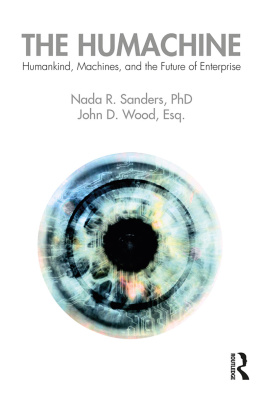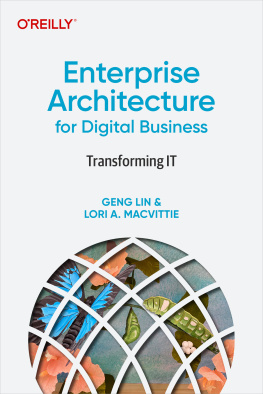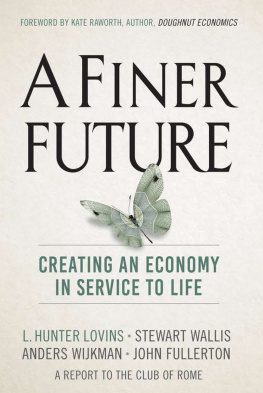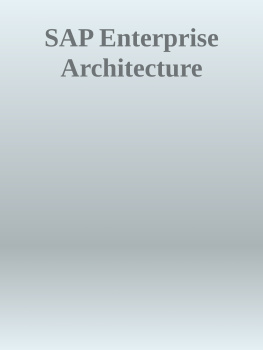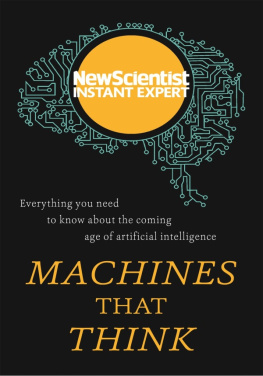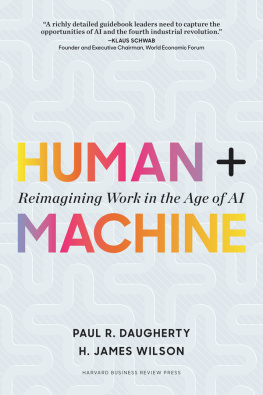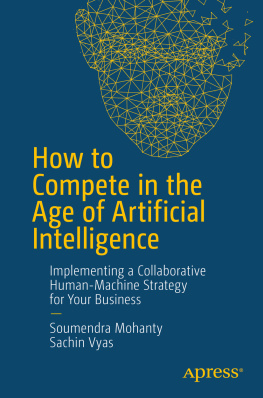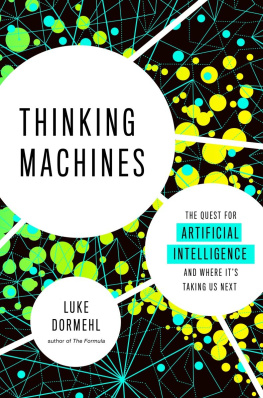Contents
Page List
Guide

THE HUMACHINE
There is a lot of hype, hand-waving, and ink being spilled about artificial intelligence (AI) in business. The amount of coverage of this topic in the trade press and on shareholder calls is evidence of a large change currently underway. It is awesome and terrifying. You might think of AI as a major environmental factor that is creating an evolutionary pressure that will force enterprise to evolve or perish. For those companies that do survive the silicon wave sweeping through the global economy, the issue becomes how to keep their humanity amidst the tumult.
What started as an inquiry into how executives can adopt AI to harness the best of human and machine capabilities turned into a much more profound rumination on the future of humanity and enterprise. This is a wake-up call for business leaders across all sectors of the economy. Not only should you implement AI regardless of your industry, but once you do, you should fight to stay true to your purpose, your ethical convictions, and indeed your humanity, even as our organizations continue to evolve. While not holding any punches about the dangers posed by AI, this book uniquely surveys where technology is limited and where the true opportunities lie amidst all the disruptive changes currently underway. As such, it is distinctively more optimistic than many of the competing titles on Big Technology.
This is a compelling book that weaves together philosophical, psychological, and legal insights; organizational governance, operations, and strategy; and technological breakthroughs and limitations. The authors set out to identify where humans and machines can best complement one another to create an enterprise greater than the sum total of its parts: the Humachine.
Combining the business and predictive acumen of Professor Nada R. Sanders, PhD, with the legal and philosophical perspective of John D. Wood, Esq., the authors combine their strengths in business strategy, forecasting, law, and sustainable business to bring us this profound yet accessible book. This is a must read for anyone interested in AI and the future of human enterprise.
Nada R. Sanders, PhD, is a distinguished professor at DAmore McKim School of Business at Northeastern University in Boston. Her expertise includes forecasting, analytics, global supply chain intelligence, and sustainability. She is the 2019 president of the Production and Operations Management Society and fellow of the Decision Sciences Institute. Her publications have appeared in California Management Review, Journal of Operations Management, International Journal of Forecasting, and Production and Operations Management Journal.
John D. Wood, Esq., is a member of the New York and Texas Bar Associations and a graduate of NYU School of Law. He is founder of The Law Firm of John D. Wood, PLLC, providing strategic counsel to property owners. His expertise includes risk management, legal compliance, and sustainable business strategy. His publications have appeared in NYU Journal of Law and Liberty, NYU Environmental Law Journal, The Environmental Law Reporter, as well as numerous Bar Association journals.
THE HUMACHINE
Humankind, Machines, and the Future of Enterprise
Nada R. Sanders
and
John D. Wood
First published 2020
by Routledge
52 Vanderbilt Avenue, New York, NY 10017
and by Routledge
2 Park Square, Milton Park, Abingdon, Oxon, OX14 4RN
Routledge is an imprint of the Taylor & Francis Group, an informa business
2020 Taylor & Francis
The right of Nada R. Sanders and John D. Wood to be identified as authors of this work has been asserted by them in accordance with sections 77 and 78 of the Copyright, Designs and Patents Act 1988.
All rights reserved. No part of this book may be reprinted or reproduced or utilised in any form or by any electronic, mechanical, or other means, now known or hereafter invented, including photocopying and recording, or in any information storage or retrieval system, without permission in writing from the publishers.
Trademark notice: Product or corporate names may be trademarks or registered trademarks, and are used only for identification and explanation without intent to infringe.
Library of Congress Cataloging-in-Publication Data
A catalog record for this title has been requested
ISBN: 978-1-138-57135-8 (hbk)
ISBN: 978-1-138-57134-1 (pbk)
ISBN: 978-0-429-00117-8 (ebk)
Typeset in Sabon
by Lumina Datamatics Limited
To the pioneers and visionaries who will shape our future.
Nada
This book is dedicated to everyone working to help technology help humanity.
John
CONTENTS
The competitive playing field is shifting, not slightly but seismically. A gaping fault line has opened in the ground, creating a branch in the evolutionary trajectory of human enterprise, dividing the past from the future.
On The Past side of the fault line are those companies that mistakenly treat AI as another piece of technology to tack on to your company (like Eeyores tail). But AI does not fit the plug-and-play model of technology adaptation. It is not like updating your workforces laptops or installing a new CRM platform. Indeed, it is unlike any technological change that has ever occurred in recorded human history.
On The Future side of the fault line are those companies implementing AI at the enterprise level, mutating into a new form of enterprise entirelyone that combines the highest capabilities of humankind with the newfound and continually emerging powers of AI.
You might think of AI as a major environmental factor being introduced to the Earths ecosphere, which will create a sort of evolutionary pressure that will force enterprise to evolve or perish. And for those companies on The Future side of the fault line, the issue becomes how to keep their humanity amidst the tumult.
What started as an inquiry for executives into how companies could adopt AI to harness the best of human and machine capabilities turned into a much more profound rumination on the future of humanity.
This is a wake-up call for executives and business leaders. Not only should you consider implementation of AI regardless of your industry, but once you do, you should consider how to stay true to your purpose, your ethical convictions, indeed your humanity, even as our organizations continue to evolve.
This is quite possibly the most important and most daunting challenge humanity has ever faced. Andwhether we succeed or failit is probably the last challenge we will ever face.
Nick Bostrom, author of Superintelligence:
Paths, Dangers, Strategies
Corporations are People, My Friend
When Mitt Romney was running for President of the United States, he used a phrase during a campaign speech that got a lot of airtime, for better or worse. On August 11, 2011, at the Iowa State Fair, responding to a protestor claiming that the government should tax corporations instead of people, Romney candidly remarked, Corporations are people, my friend.
To be fair, a corporation very much just is the directors, the officers, the managers, the laborers, the shareholders, and the individual purchasersall of these

